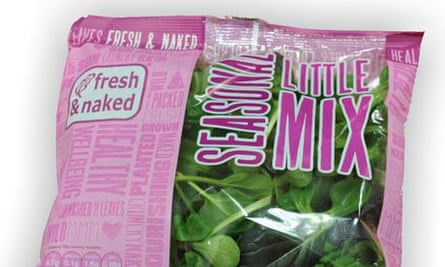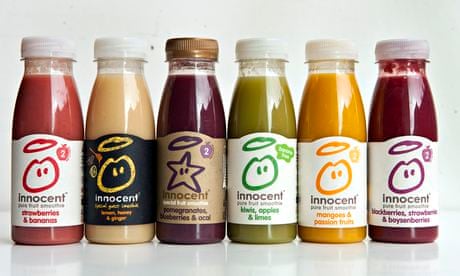"Keep me in the fridge" is now the standard instruction on bagged salads and juice bottles. You barely register it; who doesn't keep salad in the crisper? Bananas are labelled "Eat me" or "Keep me", salad packs invite the buyer to "wash me thoroughly", and a Terry's Chocolate Orange says that "My delicious chocolate segments are made with real orange oil!"
British food packaging now has a matey, at worst babyish, tone that simply didn't used to be there – commonly, food is describing itself in the first person. My basket of groceries now addresses me as though we are killing time on Facebook. I began to wonder when we arrived at this cringey consensus, and why.
Some know the phenomenon as "wackaging", the Guardian's own Rebecca Nicholson launched a Tumblr dedicated to it a few years back, with a slogan proclaiming "I blame Innocent smoothies". And the company, born from a start-up by a group of Cambridge students in 1999, surely marked a watershed in groceries that give good chat.
"To be honest, we were mucking about when we started. None of us were copywriters back then, we didn't have an agency to write stuff for us, and we had this space on our labels that we had to fill with something," Lucie Bright, Innocent's copywriter, tells me. "It wasn't a conscious decision designed to differentiate us from anyone else. We've always talked to everyone in the same way we talk to our friends, but with fewer swear words. It's how we started off, and we saw no reason to change as we got bigger."
When any cultural feature becomes more casual, it's tempting to attribute it to pervasive Americanism. Yet there's also something distinctly British about this marketing, particularly in its more surrealistic forms. Innocent juice bottles display photos and captions that owe more to Monty Python than Coca Cola. "But Mum, I'm cold," complains a polar bear. "Can't we go to Lanzarote like Uncle Terry?"
What Innocent did was daring in the late 1990s, but its influence has spread, so that an awful lot of packaging has an overly twee bent. "Since Innocent began, lots of brands have emerged who have a more human and informal tone of voice on their packaging," acknowledges Bright. "We think this can only be a good thing."
But it can also be a tiresome thing. VitaminWater asks us to recycle its bottle because "Green is definitely the new black", while Eager juice insists that "Orange, with bits, is the new black". It also gives its customer phoneline, but it's not for personal problems, which are "way beyond Eager's remit".
I buy Eager orange juice, because it's not from concentrate and it tastes good, but for me the packaging is a turn-off. I asked Eager Drinks founder Ed Rigg how it came about. "The personality developed as the brand gained more followers, and we saw an opportunity to drive the consumer conversation," he says. "The chatty, humorous language attracts customers and makes them eager about the brand." He can't stop! Punning; it's a way of life.

Fresh & Naked salad, meanwhile, has packaging that dates from a 2013 redesign and includes a litany of cheeky asides; the web URL is accompanied by the line: "Make sure you type it carefully! Or you could raise more than a few eyebrows!" Amy Quant, brand manager of G's, the company behind Fresh & Naked, says the saucy branding originated as a way to emphasise that this salad is unprocessed, or "naked".
"The brand name more or less dictated the style and 'voice' for the packaging," she says. "We might be a little cheeky, but never crude, corporate or condescending."
Laidback labelling is here to stay. However normalised "wackaging" becomes, I just can't shake the feeling that talking food is best left to toddlers. Lucie Bright of Innocent is probably right that this cultural lightening up is, broadly, a good thing. But must we label food in such a self-consciously crazy way? Let's please stop before "store in a cool, dry place" becomes "I love it in the cupboard!"

Comments (…)
Sign in or create your Guardian account to join the discussion